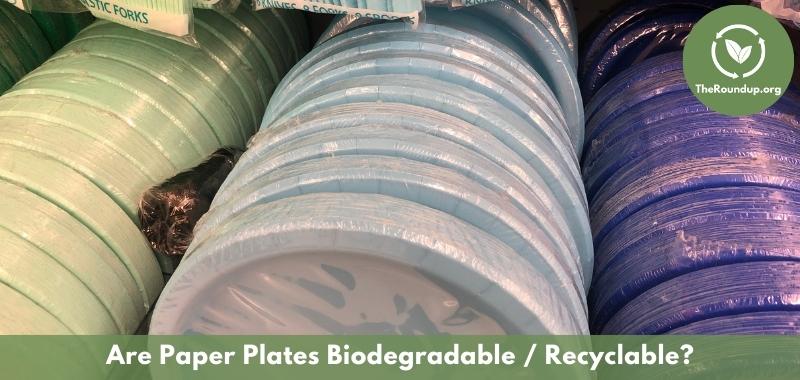
There are circumstances when you might consider using paper plates. They’re convenient for picnics, cookouts, parties, or even when you just don’t want to do the dishes.
But are paper plates biodegradable? And if they’re not, what happens to them after we throw them away?
In this article, I’ll answer all of your questions about paper plates...and hopefully, even cover a few you’ve not even thought of!
Contents

The answer to this question is a little complicated. Technically, a disposable plate made from paper is biodegradable. But that doesn’t mean it’ll break down on your backyard compost pile.
Paper plates are made from wood pulp, which is a natural material. However, they’re often coated with plastic or wax to make them water-resistant. This coating makes them non-recyclable and not compostable.
So, if you’re using paper plates at your next party, be sure to check the packaging to see if they’re coated.
Again, the answer to this question is a little complicated. Paper plates can be recycled, but only if they’re not coated with plastic or wax.
Also, most recycling plants will not recycle paper plates if they’re dirty, so you need to clean off food residue before tossing it into the recycle bin. This somewhat negates the convenience of using paper plates.
Just because paper plates are biodegradable doesn’t mean they’re good for the environment. In fact, paper plates have a pretty big carbon footprint.
Making a paper plate uses a lot of energy and water. And when the plates are thrown away, they often end up in landfills (due to recycling issues when dirty), where they’ll take years to break down.
Also, the chlorine-based chemicals used to bleach white paper plates can be hazardous to living organisms.
If you’re looking for a more eco-friendly option than paper plates, there are plenty of great alternatives:
The terms biodegradable and compostable are often used interchangeably, but they mean different things:
Arabella has covered this topic in more detail in her excellent What Does Biodegradable Mean? An Easy 5 Minute Guide article.
If your paper plate is coated with a plastic or wax coating, you should remove this before tossing it on your compost pile. Failure to do so will mean your paper plates decompose much slower.
The best way to remove the coating is to soak the plates in hot water for a few minutes. This will help to loosen the coating so you can scrape it off.
Once you’ve removed the coating, you can compost the plates as usual. Tearing the plate into small pieces will help it break down quicker.
Most biodegradable paper plates are technically freezer and microwave safe. But you should avoid putting them in the oven as the high temperatures can cause them to catch fire.
That said, if the plate is coated with wax or plastic, you’re risking having it leach into the food when exposing it to extremes of heat and cold. You should always check the manufacturer’s recommendations regarding microwave and freezer use.
If you’re using a biodegradable paper plate for hot foods, I also recommend double-checking the manufacturer’s instructions first. Some types of biodegradable paper may not be suitable for extremely hot foods.
Personally, I’d only ever use biodegradable plates for cold food and keep them out of the microwave and freezer.
The cost of washing dishes will depend on several factors, including the cost of water and electricity, the type of dishwasher you have, and how much detergent you use.
However, if using an energy-efficient dishwasher with an eco setting, it’s almost always cheaper (and better for the environment) to wash reusable plates rather than using paper plates.
Yes, biodegradable paper plates usually cost more than regular paper plates (most sustainable products are more expensive). But it’s important to remember that they’re also better for the environment.
No, biodegradable paper plates certified for food use should not leach chemicals into food. However, if the plate is coated with wax or plastic, there’s a risk that these materials could leach into the food (especially if you heat them up or eat hot food off them).
This is a tough one to answer in a few lines, so I’ll probably do an entire article on this topic in the future. Paper and plastic plates both have their pros and cons, and I look forward to drilling down deeper at a later date.
So there we have it. Most paper plates are biodegradable, but it’s not quite as straightforward as you might initially think.
Biodegradable and compostable plates are better for the environment than disposable plates. Disposable paper plates end up in landfill and cause unnecessary pollution.
If you’re looking for an eco-friendly option, choose biodegradable paper plates made from sustainable materials that don’t have a plastic or wax coating.
Or, even better, ditch the paper altogether and stick to reusable eco-friendly dinnerware washed with natural dish soap or on an eco setting in an energy-efficient dishwasher.
Do you use plastic and paper plates for family gatherings and parties? Or do you stick to standard reusable plates? Drop me a line and let me know.

